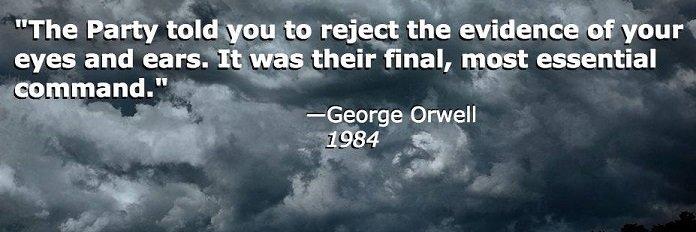-
Posts
3,024 -
Joined
-
Last visited
-
Days Won
19
Content Type
Profiles
Forums
Events
Articles
Everything posted by Wideleft
-
Totally unrelated: "A new report by the UN Committee Against Torture accuses Ottawa of being “complicit” to human rights violation committed against three Arab-Canadian men held in Syria after 9/11." https://nationalpost.com/news/canada/un-torture-report-condemns-canada-for-being-complicit-in-rights-violations
-
Their indispensable tool:
-
Because they at least tried to do the right and moral thing? I thought conservatives were all about morality.
-
"Where we farm is also a factor. “In some cases, we make ridiculous decisions in terms of where we grow crops,” Rodell said. One Saudi company is growing alfalfa in the Arizona desert, pulling from the area’s groundwater supplies. That alfalfa is then shipped overseas to feed cattle in Saudi Arabia, where industrial-scale farming of forage crops has been banned to conserve the nation’s water." Gift Article Here’s where water is running out in the world — and why https://wapo.st/3YEH2li
-
Love the closing scene in Seven Psychopaths.
-
"Losing it" is not an accurate portrayal of that discussion, but I do also realize that hyperbole is part of your shtick.
-
The bottom of the order has started...
-
What a pitching duel last night! Kikuchi more than makes up for Manoah's struggles.
-

Bombers @ Stamps : Week of Aug 18 Thread
Wideleft replied to Noeller's topic in Blue Bomber Discussion
I have 2 cousins that live near Yellowknife. Scary stuff, indeed. -

Bombers @ Stamps : Week of Aug 18 Thread
Wideleft replied to Noeller's topic in Blue Bomber Discussion
https://firesmoke.ca/forecasts/current/ -
Apparently, you can't judge a book by it's cover - especially if the cover quotes from reviews: Two critics who reviewed a book by Jordan Peterson have said their articles were quoted on its cover in a misleading way. Quotes from reviews published in the Times and the New Statesman were used on the cover of the paperback edition of Peterson's Beyond Order. The book cover quoted a line from the Times saying the book was "a philosophy of the meaning of life". But it didn't mention that the review described that philosophy as "bonkers". Peterson and his publishers Penguin have not yet responded to the BBC's request for comment. The Canadian psychology professor has gained a loyal following partly due to his opinions on so-called "culture war" issues such as white privilege, gender-neutral pronouns and gender roles. But the 61-year-old is a controversial figure who is derided by others for his views. Beyond Order: 12 More Rules For Life, which was published in paperback last May, quoted Johanna Thomas-Corr's review in the New Statesman on its cover. She said the quote that was selected to market the book was a "gross misrepresentation" of her 2,500-word review. Thomas-Corr, who is also literary editor of the Sunday Times, posted on X (formerly Twitter): "I don't have it in me to write some causally witty thing about how horrifying this is." She added that her quote "should be removed". Thomas-Corr's review appeared in the New Statesman, a left-leaning current affairs magazine, in March 2021, when the original hardback edition of the book was published. Her article referred to what she called the "inadvertent comedy" of the book, and said Peterson spent several pages "ranting". Her lengthy review also said: "His unwillingness to address detail or confront counter-arguments feels cowardly. "He repeatedly identifies masculinity with order and femininity with chaos and makes it clear which side he feels we should favour." But Thomas-Corr's review did feature some praise, and it was these passages that were quoted on the paperback's cover. One line quoted Thomas-Corr saying it was "genuinely enlightening and often poignant". Another said: "Here is a father figure who takes his audience seriously. And here is a grander narrative about truth, being, order and chaos that stretches back to the dawn of human consciousness." However, Marriot has also also suggested his review had been quoted selectively to "disguise" the fact it was largely negative. In a since-deleted post, Marriott jokingly praised the "incredible work from Jordan Peterson's publisher", adding: "My review of this mad book was probably the most negative thing I have ever written." The full-length review described Peterson's prose as "repetitious, unvariegated, rhythmless, opaque and possessed of a suffocating sense of its own importance". Only in a paragraph praising one particular chapter did Marriott say the text was the best prose Peterson had written. Marriott's full review otherwise said the book "nails together shower thoughts, random prejudices and genuine insights into a decidedly rickety structure", and repeatedly used the word "bonkers" to describe Peterson's philosophy. At the time of writing, Marriott's review still features on Penguin's online page for the book. Beyond Order: 12 More Rules For Life was a follow-up to Peterson's 12 Rules for Life: An Antidote to Chaos. Another review by Suzanne Moore in the Telegraph said Peterson's book featured "hokey wisdom combined with good advice". The book jacket cut out the word "hokey" so the quote read only: "Wisdom combined with good advice." However, Moore gave a positive review to the book overall, awarding it four stars. Although it is normal for publishers to use techniques to increase sales, the complaints could raise questions in the publishing industry about selective quoting. The matter does not fall under the remit of the Advertising Standards Authority because the quotes feature on a book jacket rather than in an advertisement. https://www.bbc.com/news/entertainment-arts-66520089?xtor=AL-72-[partner]-[bbc.news.twitter]-[headline]-[news]-[bizdev]-[isapi]&at_medium=social&at_campaign=Social_Flow&at_bbc_team=editorial&at_link_type=web_link&at_campaign_type=owned&at_format=link&at_ptr_name=twitter&at_link_origin=BBCNews&at_link_id=C04BBB50-3C4D-11EE-92CC-18F9FD754D29
-
-
Yup. People point to Alberta as this great panacea for cheap competitive prices. Simply does not apply in tourism towns like Canmore, Drumheller etc.
-
Schoen
-
As a liquor drinker in the city, I have to disagree. When I grew up in the rurals, I knew more than a few "outlets" for "hard liquor".
-
From today's Washington Post: Charges: Violation of the Georgia RICO Act; conspiracy to commit impersonating a public officer; two counts of conspiracy to commit first-degree forgery; two counts of conspiracy to commit false statements and writings; conspiracy to commit filing false documents. Roman helped coordinate the alternate-elector plan with other Trump lawyers and top aides. Roman sent emails about the elector plan that were later published by the House committee that investigated the Jan. 6 attack. He circulated a detailed spreadsheet that kept track of each of the seven states that Biden had won but where he and others on the campaign were urging Trump’s electors to gather and vote on Dec. 14, 2020. An attorney did not immediately respond to a request for comment.
-

Bombers @ Stamps : Week of Aug 18 Thread
Wideleft replied to Noeller's topic in Blue Bomber Discussion
If only we lived in a world where billionaires paid for their own god-damned facilities. -

Bombers @ Stamps : Week of Aug 18 Thread
Wideleft replied to Noeller's topic in Blue Bomber Discussion
-
The Guardian on the new law: https://www.theguardian.com/us-news/2023/may/05/georgia-brian-kemp-bill-remove-local-prosecutors#:~:text=Georgia governor signs bill that allows removal of district attorneys,-This article is&text=Georgia's governor%2C Brian Kemp%2C signed,be adequately enforcing the law.
-
A very good read: OPINION Pierre Poilievre, the class tourist who didn’t read the guidebook SHANNON PROUDFOOT OTTAWA PUBLISHED AUGUST 11, 2023UPDATED AUGUST 13, 2023 Near the end of July, Conservative Leader Pierre Poilievre paced a rally stage in Sault Ste. Marie, Ont., showing off his summer makeover: no glasses, grey pants, a white henley shirt with the sleeves pushed up, but still with the expensive-looking shoes. He was in full what-a-nice-young-man mode, cracking cheesy jokes that the crowd ate up, mocking Prime Minister Justin Trudeau and flexing about how everything would be better if he took the top job. Mr. Poilievre had drawn a good crowd of about 400 and opened with a classic campaign-style anecdote. A local waitress ran over to give him a big hug that morning, he said, and she ordered him to “Get him out, get in there and fix this” – meaning the various ways in which Mr. Trudeau was laying waste to the country. Later in his remarks, Mr. Poilievre returned to this waitress to make a point about the burden of taxes and benefits clawbacks. ”I don’t know her personal story, but let’s say that she has three kids,” he said. “And let’s say that she earns $60,000, 25 bucks an hour.” At this point, several people even in that extremely friendly audience made little strangled noises of surprise and confusion, the human equivalent of a record-scratch sound effect. A waitress in a blue-collar Northern Ontario city pulling down a cool $60,000 a year? The median income of everyone in Sault Ste. Marie – including the lawyers, the doctors, the teachers and all the people who work in the service industry or manufacturing jobs like Algoma Steel – was $40,800 in 2020. The average annual income of people working in the food service industry across Canada was $21,175 last year. Outtakes from a ‘kinder, gentler’ Pierre Poilievre’s efforts to flip the script It would be as churlish to make a big thing out of a minor gaffe like that as it would be to point out that Mr. Poilievre began making $141,200 as a 25-year-old MP in 2004 and now makes $287,400, so perhaps his voter narratives are graded on a curve. Or rather, it would be cheap to point out such discrepancies – if Mr. Poilievre didn’t keep saying out-of-touch or insulting things as he wages his chosen game of class warfare. A week earlier, in trying to make a point about housing, he asked why it cost $550,000 in Niagara Falls to buy a “tiny little shack,” and even gave the address of this supposedly decrepit abode. As it turned out, a real person lived there and she found his remarks “a little embarrassing” for reasons we can all understand. What’s more, her house was a perfectly lovely 1.5-storey postwar home that would not look at all odd or shack-like to many, many Canadians – especially the working-class people Mr. Poilievre keeps fetishizing. Sault Ste. Marie, which is where I grew up, is home to entire blocks lined with identical houses, and many in that crowd of political admirers would have left a house exactly like that to attend his rally. Back in May at an airport, Mr. Poilievre recorded a selfie video that can only be described as deeply weird. “I just had a great weekend, meeting with the common people, listening to their common sense. I just want to remind everyone politics is supposed to be a blue-collar job. Check out these boots,” he said into the lens, before panning toward his blurry and apparently muddy feet. “That’s what it’s like to be out with the people, in the rain, attending their festivals, listening to their stories, hearing their dreams.” If I know anything about the working class, it’s that they constantly refer to themselves, in the manner of a particularly cringey museum exhibit, as “common people” who delight in primitive “festivals.” And they absolutely view dirty boots as something to preen about, like an especially successful Halloween costume. But the bigger problem with Mr. Poilievre’s class tourism is this: He has grasped a real thing that is simmering just below a boil. Too many people feel like they can’t afford any sort of reasonable life or even pin the hopes of such a thing to their children. And many people – some included in the group above, some not – feel ignored, maligned and scolded by the current federal government. But in seizing on those feelings without an evident shred of real empathy, perspective or authenticity, Mr. Poilievre seems to see them as smouldering embers of resentment to be fanned for his own purposes, rather than a set of real problems in need of solving. My dad – Northern Ontario working-class smarts through and through – once told me: “Don’t trust anyone who doesn’t drink or swear.” That advice isn’t really about alcohol and cursing. What it means is that you should be careful around someone who refuses to let down their guard, who keeps their true self bottled up in the packaging they want you to see. What it also means is that so-called common people are not idiots. They know very well when they’re being patronized – or when someone is pretending. And they deserve something better than being patted on the head and treated like cardboard cut-outs by someone who claims to understand the very real stresses in their life. https://www.theglobeandmail.com/politics/article-pierre-poilievre-the-class-tourist-who-didnt-read-the-guidebook/
-
You're thinking of Ronnie Jackson, not Ron Johnson. Johnson is a moron unto himself. Not surprisingly, Jackson was elected to the House of Representatives by the fine people of Texas 13.
-
Yup. Maddow mentioned the new law passed by the Georgia State Government that would allow that. Sickening.
-
4 things revealed by Trump’s Georgia indictment Analysis by Aaron Blake Staff writer August 15, 2023 at 1:38 a.m. EDT (Edited for brevity) 1. The ‘co-conspirators’ do get indicted — in Georgia, at least The biggest way in which this indictment isn’t like the others? The Trump allies it ensnared. Smith opted this month to bring a case against Trump alone while listing six unnamed (but mostly easily identifiable) associates as unindicted co-conspirators. Willis has gone in a different direction, also indicting 18 others she says took part in the criminal enterprise. Those 18 include five of the six unindicted co-conspirators from the federal indictment, most notably former New York mayor and federal prosecutor Giuliani, who faces 13 counts of his own. The others: Powell, who is accused of orchestrating a breach of voting machines in Coffee County, Ga. Trump lawyer John Eastman, a key figure in the alternate-elector plot Trump-aligned lawyer Kenneth Chesebro, another key figure in the alternate-elector plot Former Justice Department official Jeffrey Clark, whom Trump aimed to install as acting attorney general and who attempted to get the DOJ to bolster baseless claims about voter fraud Others of note, who weren’t listed as co-conspirators in the federal indictment, include Meadows, Trump campaign legal adviser Jenna Ellis and state Republican Party Chairman David Shafer. These aren’t the first non-Trump white-collar defendants to be prosecuted for their efforts to overturn the 2020 election — Michigan’s attorney general recently indicted 16 alternate Trump electors, including a former state party chair — but these are the first ones close to Trump. The indictments could ramp up pressure on the defendants to provide information and possibly even serve as witnesses against Trump, either in Georgia or in the federal case, where charges could still be brought against them. 2. The indictment focuses on false statements, oaths A core Trump defense in the federal Jan. 6 case is the idea that he was merely exercising free speech. But that defense won’t work as easily in Georgia, which has a broad prohibition against making “a false, fictitious, or fraudulent statement or representation … in any matter within the jurisdiction of any department or agency of state government.” That law figures heavily in the indictment, with the phrase “false statement” appearing more than 100 times, including as individual counts and as part of the alleged racketeering. (The indictment lists 161 overt acts as part of the latter.) Defendants like Trump and Giuliani are accused of making false statements about voter fraud publicly, in legal filings, in hearings in Georgia and elsewhere. Another frequently included crime is solicitation of violation of public oath by a public officer. Essentially, this amounts to asking someone to violate their sworn duties, including by asking them to help overturn a legitimate election result. The most notable example: Trump’s Jan. 2, 2021, call to Georgia Secretary of State Brad Raffensperger (R) during which he told Raffensperger he needed to “find” just enough votes to overturn the result. Meadows was also indicted over his role in the call. Trump and others, including Giuliani, Eastman and Chesebro, are also charged in the alternate-elector plot with various conspiracies, including to commit forgery, a charge that was also brought against the Michigan alternate electors. 3. The crimes allegedly went well past Jan. 6 One of the more striking details comes in the 38th and 39th counts — the last charges against Trump — which date to Sept. 17, 2021, nearly eight months after Trump left office. The charge has to do with a letter Trump sent to Raffensperger in which he enclosed a report alleging that 43,000 ballots in Atlanta-based DeKalb County were not properly handled using chain-of-custody rules. Trump suggested that Raffensperger “start the process of decertifying the election, or whatever the correct legal remedy is, and announce the true winner.” The indictment accuses Trump and others of having “corruptly solicited Georgia officials, including the Secretary of State and the Speaker of the House of Representatives, to violate their oaths to the Georgia Constitution and to the United States Constitution by unlawfully changing the outcome of the November 3, 2020, presidential election in Georgia in favor of Donald Trump.” After Trump left office, many Republicans urged him to stop talking about a “stolen election” for fear it would damage their party in the aftermath of the Jan. 6, 2021, attack on the Capitol. But Trump was unswayed. It wound up costing the GOP in the 2022 election, and now it’s cost Trump in the form of additional charges. 4. The political impact might not be the trial The prosecution of Trump and the others in Fulton County will stand out for one distinct reason: Unlike the federal trials (unless the rules change), it should be televised. That will seemingly bring a measure of transparency to the high-stakes proceedings and create appointment viewing — just as the House Jan. 6 committee hearings did last year but potentially with even greater numbers. But unlike the other trials, that spectacle is less likely to play out when it matters politically. The many defendants and Trump’s already crowded legal calendar make this a strong candidate for getting delayed past the 2024 election. Willis says she will ask for a trial date within six months, but that’s ambitious. That doesn’t mean it won’t matter politically. As noted above, the charges against Trump allies could matter when it comes to how the federal prosecution takes shape. Trump’s attacks on witnesses could create problems under Georgia’s witness intimidation laws, which allow bail only if there is “no significant risk of intimidating witnesses.” And there remains the possibility of Trump’s winning the 2024 election and facing this trial as a sitting president. https://www.washingtonpost.com/politics/2023/08/15/takeaways-trump-georgia-indictment/





